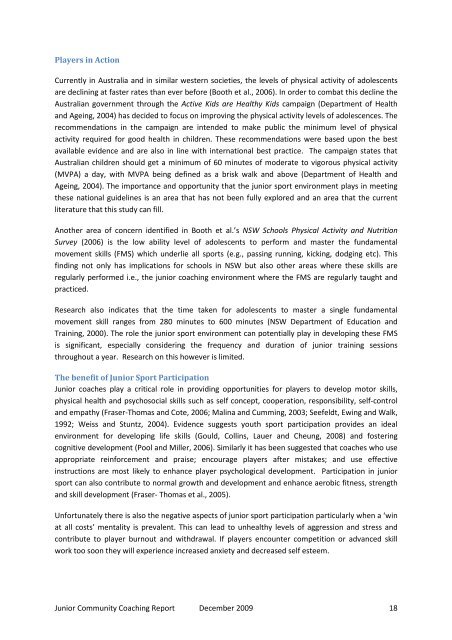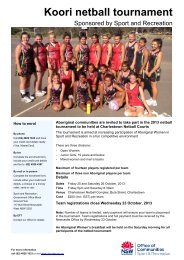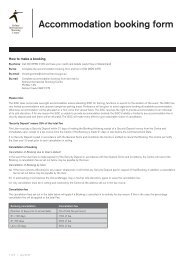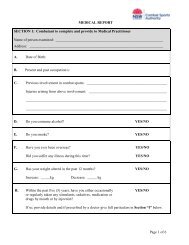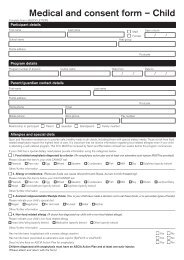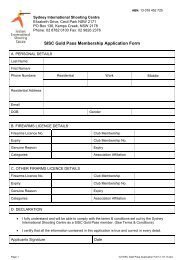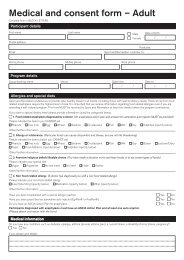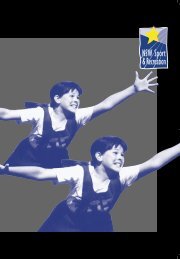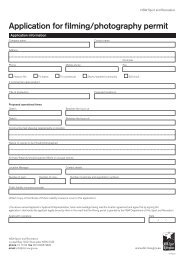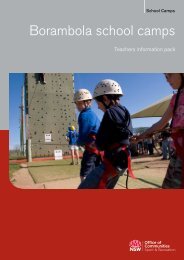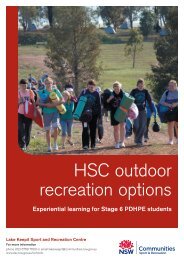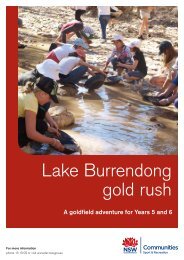Community Junior Sport Coaching final report - 2009
Community Junior Sport Coaching final report - 2009
Community Junior Sport Coaching final report - 2009
You also want an ePaper? Increase the reach of your titles
YUMPU automatically turns print PDFs into web optimized ePapers that Google loves.
Players in Action<br />
Currently in Australia and in similar western societies, the levels of physical activity of adolescents<br />
are declining at faster rates than ever before (Booth et al., 2006). In order to combat this decline the<br />
Australian government through the Active Kids are Healthy Kids campaign (Department of Health<br />
and Ageing, 2004) has decided to focus on improving the physical activity levels of adolescences. The<br />
recommendations in the campaign are intended to make public the minimum level of physical<br />
activity required for good health in children. These recommendations were based upon the best<br />
available evidence and are also in line with international best practice. The campaign states that<br />
Australian children should get a minimum of 60 minutes of moderate to vigorous physical activity<br />
(MVPA) a day, with MVPA being defined as a brisk walk and above (Department of Health and<br />
Ageing, 2004). The importance and opportunity that the junior sport environment plays in meeting<br />
these national guidelines is an area that has not been fully explored and an area that the current<br />
literature that this study can fill.<br />
Another area of concern identified in Booth et al.’s NSW Schools Physical Activity and Nutrition<br />
Survey (2006) is the low ability level of adolescents to perform and master the fundamental<br />
movement skills (FMS) which underlie all sports (e.g., passing running, kicking, dodging etc). This<br />
finding not only has implications for schools in NSW but also other areas where these skills are<br />
regularly performed i.e., the junior coaching environment where the FMS are regularly taught and<br />
practiced.<br />
Research also indicates that the time taken for adolescents to master a single fundamental<br />
movement skill ranges from 280 minutes to 600 minutes (NSW Department of Education and<br />
Training, 2000). The role the junior sport environment can potentially play in developing these FMS<br />
is significant, especially considering the frequency and duration of junior training sessions<br />
throughout a year. Research on this however is limited.<br />
The benefit of <strong>Junior</strong> <strong>Sport</strong> Participation<br />
<strong>Junior</strong> coaches play a critical role in providing opportunities for players to develop motor skills,<br />
physical health and psychosocial skills such as self concept, cooperation, responsibility, self-control<br />
and empathy (Fraser-Thomas and Cote, 2006; Malina and Cumming, 2003; Seefeldt, Ewing and Walk,<br />
1992; Weiss and Stuntz, 2004). Evidence suggests youth sport participation provides an ideal<br />
environment for developing life skills (Gould, Collins, Lauer and Cheung, 2008) and fostering<br />
cognitive development (Pool and Miller, 2006). Similarly it has been suggested that coaches who use<br />
appropriate reinforcement and praise; encourage players after mistakes; and use effective<br />
instructions are most likely to enhance player psychological development. Participation in junior<br />
sport can also contribute to normal growth and development and enhance aerobic fitness, strength<br />
and skill development (Fraser- Thomas et al., 2005).<br />
Unfortunately there is also the negative aspects of junior sport participation particularly when a ‘win<br />
at all costs’ mentality is prevalent. This can lead to unhealthy levels of aggression and stress and<br />
contribute to player burnout and withdrawal. If players encounter competition or advanced skill<br />
work too soon they will experience increased anxiety and decreased self esteem.<br />
<strong>Junior</strong> <strong>Community</strong> <strong>Coaching</strong> Report December <strong>2009</strong> 18


